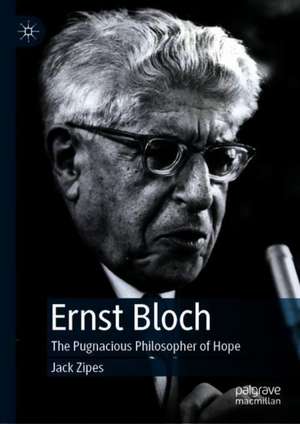Ernst Bloch: The Pugnacious Philosopher of Hope
Autor Jack Zipesen Limba Engleză Hardback – 16 aug 2019
| Toate formatele și edițiile | Preț | Express |
|---|---|---|
| Paperback (1) | 495.33 lei 43-57 zile | |
| Springer International Publishing – 16 aug 2020 | 495.33 lei 43-57 zile | |
| Hardback (1) | 446.23 lei 38-44 zile | |
| Springer International Publishing – 16 aug 2019 | 446.23 lei 38-44 zile |
Preț: 446.23 lei
Preț vechi: 485.03 lei
-8% Nou
Puncte Express: 669
Preț estimativ în valută:
85.39€ • 88.65$ • 71.21£
85.39€ • 88.65$ • 71.21£
Carte tipărită la comandă
Livrare economică 19-25 martie
Preluare comenzi: 021 569.72.76
Specificații
ISBN-13: 9783030211738
ISBN-10: 3030211738
Pagini: 213
Ilustrații: XVIII, 213 p. 2 illus., 1 illus. in color.
Dimensiuni: 148 x 210 x 21 mm
Greutate: 0.41 kg
Ediția:1st ed. 2019
Editura: Springer International Publishing
Colecția Palgrave Macmillan
Locul publicării:Cham, Switzerland
ISBN-10: 3030211738
Pagini: 213
Ilustrații: XVIII, 213 p. 2 illus., 1 illus. in color.
Dimensiuni: 148 x 210 x 21 mm
Greutate: 0.41 kg
Ediția:1st ed. 2019
Editura: Springer International Publishing
Colecția Palgrave Macmillan
Locul publicării:Cham, Switzerland
Cuprins
1. Reintroducing Bloch: In Pursuit of Utopia.- 2. The Struggle against the Obscenity of Hope.- 3. Ernst Bloch and the Dialectics of Obscenity and Inequality.- 4. The Pugnacity and Speculation of Hope, or Why We Want a Better World.- 5. The Messianic Power of Fantasy in the Bible.- 6. Ernst Bloch’s Enlightened View of the Fairy Tale and Utopian Longing.- 7. The Utopian Function of Fairy Tales and Fantasy: Ernst Bloch the Marxist and J. R. R. Tolkien the Catholic.- 8. Kitsch, Colportage, and the Liberating Potential of Vor-Schein in Fairy Tales.- 9. Epilogue: Why Hope?
Recenzii
“Zipes’s book opens new perspectives and gives reflective insight based on Bloch’s thought which in general is hard in Blochian studies.” (Antonina Strano, Bloch-Almanach, Issue 19, 2019)
Notă biografică
Jack Zipes is Professor Emeritus of German and Comparative Literature at the University of Minnesota, USA. Some of his recent publications include: The Enchanted Screen: The Unknown History of Fairy-Tale Films (2010), The Irresistible Fairy Tale: The Cultural and Social History of a Genre (2012), and Grimm Legacies: The Magic Power of Fairy Tales (2014). He has also translated the first 1812/15 edition of the Grimms' tales, The Original Folk and Fairy Tales of the Brothers Grimm (2014). Most recently he has published The Sorcerer’s Apprentice: An Anthology of Magical Tales (2017), Tales of Wonder: Retelling Fairy Tales through Picture Postcards (2017). Fearless Ivan and His Faithful Horse Double Hump (2018), and Fairy Tales and Fables from Weimar Days (2018).
Textul de pe ultima copertă
This book provides a comprehensive introduction to and overview of the life and philosophy of Ernst Bloch. Bloch has had a strange fate in the English-speaking world. He wrote his famous three-volume opus, The Principle of Hope, while living in exile in the United States from 1938 to 1940. It was first published, however, in East Germany in the 1950s after he had returned to Europe and became a professor of philosophy at the University of Leipzig. Gradually, his other numerous works became better known and widespread in Europe and scholars in the US and UK started to take note of his works. Yet, he has still remained a somewhat neglected figure in the humanities. While this book does not set out to entirely rectify this neglect, it does offer readers an introduction to Bloch’s works and the opportunity to understand more about the importance of utopian thought. Through an exploration of some of Bloch’s more controversial communist leanings and relationship to the Soviet Union, a study of Bloch’s utopian quest, and even a comparison with J. R. R. Tolkien, this comprehensive study demonstrates just how interesting a figure Ernst Bloch really was, and how his philosophy of hope has laid the basis for secular humanism.
Caracteristici
Introduces Bloch to new readers, and to those wishing to understand more about the importance of utopian thought Explores present-day implications of both Bloch's philosophy and criticisms of it Explains how and why Bloch's philosophy of hope has always appealed to theologians
